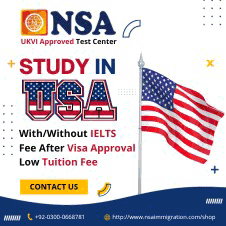Study in Australia Questions
What are the top five reasons to study in Australia?
-
Programs taught in English language.
-
Enough research opportunities.
-
Quality education.
-
Offers part time job opportunities.
-
Offer internationally recognized degrees
What are the general visa requirements for Australia study visa?
-
Confirmation of enrollment.
-
English language certificate
-
Complete application form.
-
Valid passport.
-
Bank statement.
What are annual admission intakes for study in Australia?
There are generally two intakes:
-
February to march.
-
May to June.
Are there any scholarships for Pakistani students to study in Australia?
Australia award scholarship.
Adelaide scholarship.
International post graduate research scholarship.
What is major medium of instruction for courses in Australia?
In Australia majority courses are offered in English. And if your native language is not English then The Australian universities required English language proficiency certificate i.e. IELTS or TOFEL
What are typical accommodation options while studying in Australia?
In Australia most of the international students live off-campus. And the off-campus accommodation options are:
-
Homestay
-
Rental property
-
Apartments
-
Flats
Can a student do a part time job in Australia while studying?
Yes, students can work part time with studying. Students can work 20 hours in their academic year.And in summer holidays there is no limit of working hours.
Does study in Australia provide u a good future?
Australia is among the happiest country in the world. And its economy is also strong. Its higher education is recognized worldwide so after your higher education a lot of opportunities welcome you with in the country and in other countries also.
Can an International student get a PR after completion of higher education in Australia?
Yes, after completion of higher studies student can apply for the permanent PR so that they can continue to live and work in Australia.
Study in Australia Interview Questions
What to say if the interviewer asks about the purpose of my trip?
The interviewer only checks the information you provided in your application form. To ensure a smooth process, all you need to do is give a clear and well-expressed answer stating that your goal is to study in Australia and obtain a degree or attend a study program.
How to reply if the interviewer asks me why I chose Australia?
Through this question, the interviewer wants to test whether you have some basic knowledge about Australia and its education system. Compared to the other options, you should concisely list why Australia was your choice for studying abroad.
What to say if asked “Have you ever been to Australia”?
If you haven't been to Australia before, be sincere and tell them. If you have been to Australia, provide them with the reason for your visit as well as the year it took place, but be brief.
How to answer if the interviewer asks about my qualifications?
Provide straightforward information about your previous qualifications, such as your degree along with your major subjects and the college or university from which you graduated.
Why you selected this university?
Through this question interviewer wants to assess that you have researched about your chosen university or not. First thing you should do is to find out everything you can about the university you want to attend. Demonstrate to your interviewer or case officers that you have investigated the university, are aware of the curriculum and reputation of the university, and are genuinely interested in studying there.
The location of your university?
Your interviewer expects you to know the location and surroundings of your university, so research well for this one.
Could you tell me something about your chosen program?
The case officer will be interested in learning about your motivation for the course and that you have a genuine interest in pursuing it. Therefore, you have to provide a general outline of the course and its structure.
What motivated you to select this course?
Make sure to convince the case officers that you really want to study this course and explain why it's important to your career in the future. They also want to ensure the chosen program is relevant to your interests. You must demonstrate to them that the course is more than just an excuse to relocate to Australia.
How this course will be beneficial for you?
Naturally, they want to know how the course will help you and how it fits with your future plans. Make sure to explain that you know the scope of your chosen degree program by naming some jobs or fields you can join after this program.
What is the total expense of your course?
Inform them about the exact cost of your chosen course, as stated in your Certificate of Enrollment (COE) from the university.
What is the duration of your chosen course?
You should provide a precise answer regarding the duration of your course and specify when it will begin and end. Since this is the information that can be verified from your Certificate of Enrollment (COE), so make sure you answer genuinely.
This course could have been completed in your home country as well. Why Australia?
Explain why you think Australia is a better option. The officer expects you to provide more specific reasons why you have decided to study in Australia. Explain the difference between the Australian course and the course taught in your home country.
After completing your studies in Australia, what are your plans?
The student visa doesn't permit students to stay in Australia after completing their study course, so you should respond that you plan to return to your home country after completing your study program.
How can you convince your interviewer that you will return to your home country after completing your course?
Be elaborative, and inform the interviewer about your family responsibilities and the career you can build after returning to your home country. That's how the interviewer will know you only want the visa to complete your education in Australia.
Do you intend to work part-time in Australia?
You can inform the case officer about your intention to work part-time in Australia while you are studying because the Australian student visa allows students to work 20 hours per week.
How will you pay your living cost in Australia while you are studying?
Provide sufficient information on how you plan to cover your living cost in Australia. Ensure you have bank statements, loan documents, or other documents you need, to prove that you are eligible to cover your living cost in Australia.
Who is funding your education?
Inform the interviewer of the individual who is paying for your studies in Australia.
Why does he or she is sponsoring your education?
However, if another person is sponsoring your education besides your father and mother, let the interviewer know why. Be comprehensive with your answer.
What is your sponsor's job, and how much does he earn annually?
Inform the case officer about your sponsor’s occupation and provide them with evidence of your sponsor's annual income (such as bank account statements).
What is your father's job and how much does he make each year?
They can verify the information, so be sure to answer genuinely and tell them what your father’s occupation is and exactly how much he makes annually. You can provide the bank statements.
Do you have any proof of your previous education?
Make sure you have the original documentation of your previous qualifications and education at the time of the interview.
Why did you switch fields of your study?
If your chosen course does not relate to your previous courses, the visa interviewer may be interested in knowing why you changed from one field of study to another. It can help them better understand your academic background as well as your motivation and commitment to your chosen study field.
Could you tell me something about your family?
Give brief and clear details about your immediate family. The officer is only confirming the details you provided on your application.
Do you plan to stay in Australia after your current course ends?
Make sure your answer is sincere and reflects your plans and intentions. Also, inform the case officer if you have yet to decide.
What plans do you have for your vacations or semester break?
You could inform the interviewer that you intend to visit friends and family in your home country during your vacations or semester breaks. Inform the case officer of any other plans.
Can you tell me about your plans for the future?
The case officer wants to know how your plans for the future relate to your chosen field of study. Let them know that you intend to return to your home country to make plans for your future and career after completing the course.
How many siblings do you have, what do they do, and do you live with them?
Let the case officer know how many siblings you have, what they all are currently doing and whether your siblings live with you or not. Be sincere and precise with your answers.
Are your TOEFL or IELTS scores available?
Hand them over your TOEFL or IELTS certificate.
Can you explain your low score?
Inform them of the reasons for your low score. But also tell them that you've progressed and are always working to improve your skills.
Can you explain your high score?
Explain how you were able to receive a high score. Tell the interviewer from where you have learned the language and what contributed to your fantastic result.
Are more people in your immediate family dependent on your sponsor beside you?
Through this question, interviewer want to know if the sponsor will be able to cover all of the cost of living and studying. Provide evidence (account statements) that your sponsor is able to continue providing you with funding, even if other people rely on the same sponsor.
Why should we grant a student visa to you?
You have to be well-prepared for this question. Be thorough and list the advantages you can gain from the visa, such as excellent higher education, etc.). You can also elaborate on how you and your contribution can benefit the university.
If your student visa is rejected, what will you do?
You can tell the case officers that you will try again and you will prepare better for the next attempt to avoid making the same mistakes as you did during the visa application process. It will reflect your positive attitude.
FREE STUDY ABROAD
Free study abroad expert advice
Modal Title
Dear User Name
We Have sent a 4-digit code to your
mobile number



.gif)































